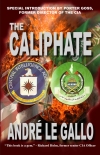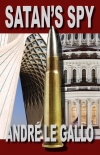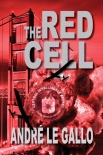The Caliphate by André Gallo (booksvooks .txt) 📗

- Author: André Gallo
Book online «The Caliphate by André Gallo (booksvooks .txt) 📗». Author André Gallo
He bent down and felt for a pulse but could only hear and feel his own heart. He moved his hand from John’s throat to his chest but felt nothing.
“How about you? Are you hit?” he asked her.
“My brother is dead,” she said in a low monotone, eyes unfocused. “We were going home tomorrow.”
Then Steve saw Kella under the table. Blood colored the loose white shirt she wore over her halter-top. “Don’t move,” he said. “How are you?”
“I don’t know yet,” she said. “I can’t move my arm.” Steve helped her up to one of the chairs. She was holding her left arm. Blood seeped onto her slacks. Steve took off his belt and used it as a tourniquet around her upper arm.
Izem had tied the surviving terrorist’s hands behind him and was now tying him to a chair. The wounded moaned, a woman shrieked in shock, her friend joined her in sympathy, some cried over their dead friends, some were in a helpless daze. Steve saw two men, whom he knew to be part of the Medecins-Sans-Frontieres group, trying to help the wounded. The floor was covered with broken glass, food, dishes, and silverware, forming islands in the middle of a crimson-tinted mixture of blood and Orangina soda.
“Take this guy to my room and keep him there until I get there,” Steve told Izem. “See what information you can get out of him in the meantime. Do not turn him over to the police. I’m going to take Kella to the hospital.”
He found Atrar, assembled Kella and two others who had been wounded and hurried to the hospital. There were as yet no police sirens to be heard.
20. Aéroport de Tombouctou
Kella, with a crewman in a flight suit on one side, and the French Embassy nurse on the other, walked under the tail and up the loading ramp of the French Air Force cargo plane—a Transall C-160, according to the crewman who had met her and Steve inside the terminal.
It was dark but she could see the outline of the high-winged aircraft outlined by red lights on its wings and tail, a tail that seemed to be two or three stories high. The pilot had not shut down the two engines and Kella tried to protect her face from the sand blowing toward her with her right hand. Her left arm was in a cast. The hard soles of the crewman’s shoes against the metal of the ramp punctuated the noise of the engines. Steve followed Kella, carrying her suitcase, which with considerable misgivings she had asked Steve to pack for her while she was at the hospital.
Before being hustled out of the plane, Steve, almost shouting to be heard over the noise of the engines, told her, “This is the best thing for you. We’re lucky this plane could pick you up. You need to get to a real hospital. Your grandfather the general will take care of you. Call me when you land.”
Kella was in pain. She winced as she tried to fit into the uncomfortable seat.
“Take care. You should really leave too. Don’t interview al Khalil. Stay away from him. They’re killers.”
Steve gave her quick kiss on the lips and went back out the loading ramp, which closed quickly behind him.
When the plane reached cruising altitude, the nurse took a look at Kella’s temporary cast.
“My name is Viviane,” she said. “We’re the only passengers. I’m here just to take care of you until we get to Paris. I think that your cast is okay until then. If you’re in pain, I can give you a painkiller if you want. It will put you to sleep. This flight doesn’t have a movie so you won’t miss much.”
Kella swallowed the pills that Viviane gave her and slept until they landed at Vélizy-Villacoublay Airport outside of Paris, where an ambulance was waiting to take her to Val de Grâce, a hospital usually reserved for the military. Kella was accorded the luxury of a private room.
***
One evening a week later, during dinner at her grandfather’s comfortable apartment on Rue de Longchamp in the upper scale 16th District, Kella’s grandfather, General Joulet, asked for a full account of what had happened to her in Timbuktu.
Kella poured coffee for the two of them and recounted her trip and the events that led to the NGO party and the terrorist attack.
“My friend Steve then took me to the Timbuktu Hospital. The doctor was Cuban but he spoke English with a New York accent.”
“Yes, Cuba has sent doctors and medical technicians all over the developing world,” he said. “During the Cold War, that niche belonged to the Bulgarians.”
“But the X-ray machine didn’t work, so he thought I should go to Dakar or Abidjan because the bullet fractured the bone. It wasn’t a clean break. Doctor Delforge said that I was lucky that the bullet missed the brachial artery. My arm is now held together by a plate and screws. My luck was that you were able to get me on that cargo plane. I am very grateful to you, Grand-père.”
Pointing to the sitting room, Joulet said, “Let’s go sit over there, Kella.” And pointing to a sofa, he added, “Take one of those pillows to put under your arm.”
After Kella got herself situated in an easy chair, Joulet brought her cup of coffee and put it on a small table to her right.
“Will you be able to return to your studies soon?”
“I’ve been thinking about that. Forced bed rest does that. I don’t know what’s happening but in the last few months I’ve seen my best friend murdered by her father, and I’ve been shot





Comments (0)